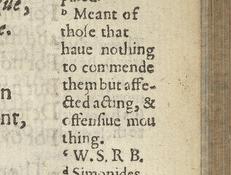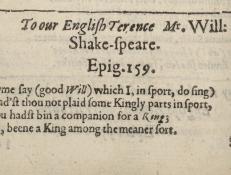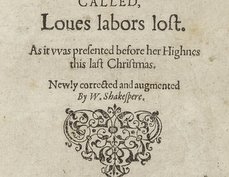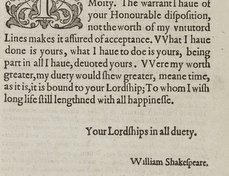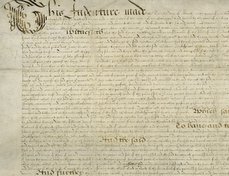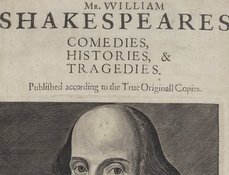From the collections of: THE BRITISH LIBRARY
Terms of use
The British Library has graciously contributed the above images to Shakespeare Documented under a Creative Commons Public Domain Mark.
Copy-specific information
Creator: John Davies
Title: Humours Heau'n on Earth; with The Ciuile Warres of Death and Fortune. As also The Triumph of Death: or, the Picture of the plague, according to the life; as it was in anno Domini. 1603.
Date: Printed by A. I.: London, 1609.
Repository: The Britsh Library, London, UK
Call number and opening: C.34.g.2, sig. H6v (p. 208)
View online bibliographic record
Alan H. Nelson, "The Civile Wars of Death and Fortune: John Davies of Hereford alludes to Shakespeare," Shakespeare Documented, https://doi.org/10.37078/597.
British Library, C.34.g.2. See Shakespeare Documented, https://doi.org/10.37078/597.
John Davies of Hereford was one of the most prolific poets of his age. He was born about 1565 and died in 1618, making him William Shakespeare’s nearly exact contemporary. Though his poems were published (perhaps self-published) in some dozen large volumes, only one reached a second edition. With literary ambitions that far out-stripped his talent, he maintained a successful career as a writing-master. At Oxford Davies instructed scholars in the art of writing, though he was not a university scholar himself. He then removed to London, where he mingled with gifted poets whom he addresses in great profusion in The Scourge of Folly (1611). The ODNB lists the most significant as “the king [James I], Francis Bacon, Sir John Davies [a namesake], Fulke Greville, Thomas Campion, Samuel Daniel, Ben Jonson, William Shakespeare, John Fletcher, John Marston, Joseph Hall, Herbert of Cherbury, Francis Beaumont, Michael Drayton, and George Chapman.”
The full title of Davies’s volume is Humours Heau’n on Earth: with The Ciuile Wars of Death and Fortune, as also the Triumph of Death. Some copies are clearly dated 1609, while others have apparently had their dates of publication altered in ink, for example to 1605. The publication, like Microcosmos (1603), is a typically rambling verse essay which distributes praise and blame on a wide range of topics.
In stanza 76, shown here, Davies’s topic is lady Fortune; an asterisk explains that the opening “Some” indicates “Stage plaiers”:
Some followed her by acting all mens parts
These on a Stage she rais’d (in scorne) to fall:
And made them Mirrors, by their acting Arts,
Wherin men saw their faults, thogh ne’r so small:
Yet some she guerdond not, to their desarts W.S.R.B.
But, othersome, were by ill-Action all:
Who while they acted ill, ill staid behinde,
(By custom of their maners) in their minde.
The “some” in line five whom Fortune failed to “guerdon,” or reward according to their deserts, are identified by an asterisk as “W.S.” and “R.B.” These initials almost certainly stand for William Shakespeare and Richard Burbage. Evidently these two were not rewarded as highly as they deserved; “othersome” must refer to less deserving actors.
Davies references William Shakespeare, more or less distinctly, in two other publications: Microcosmos (1603) and The Scourge of Folly (1611). Scourge of Folly includes Shakespeare’s name in full; in Microcosmos, like in The Civile Wars discussed above, Shakespeare is referenced more cryptically, as “W.S.”
Written by Alan H. Nelson
Sources
Oxford Dictionary of National Biography, s.v. “Davies, John (1564/5–1618),” by P. J. Finkelpearl, accessed May 16, 2016, doi:10.1093/ref:odnb/7244.
F.J. Furnivall, C.M. Ingleby, and L. Toulmin Smith, comps, The Shakspere Allusion-Book: a collection of allusions to Shakspere from 1591 to 1700, ed. John Munro (London: Oxford University Press, 1932: vol. I, 204).
Last updated January 25, 2020


